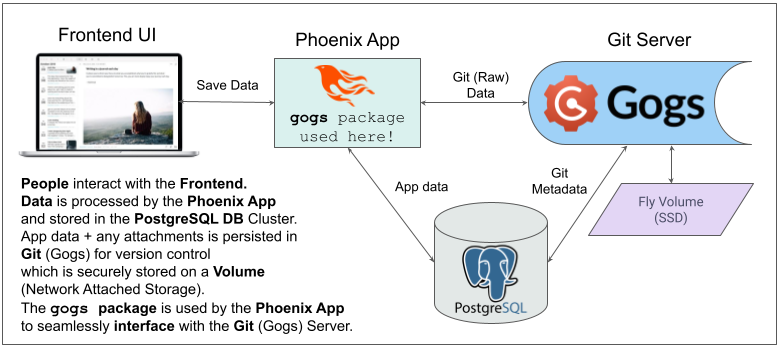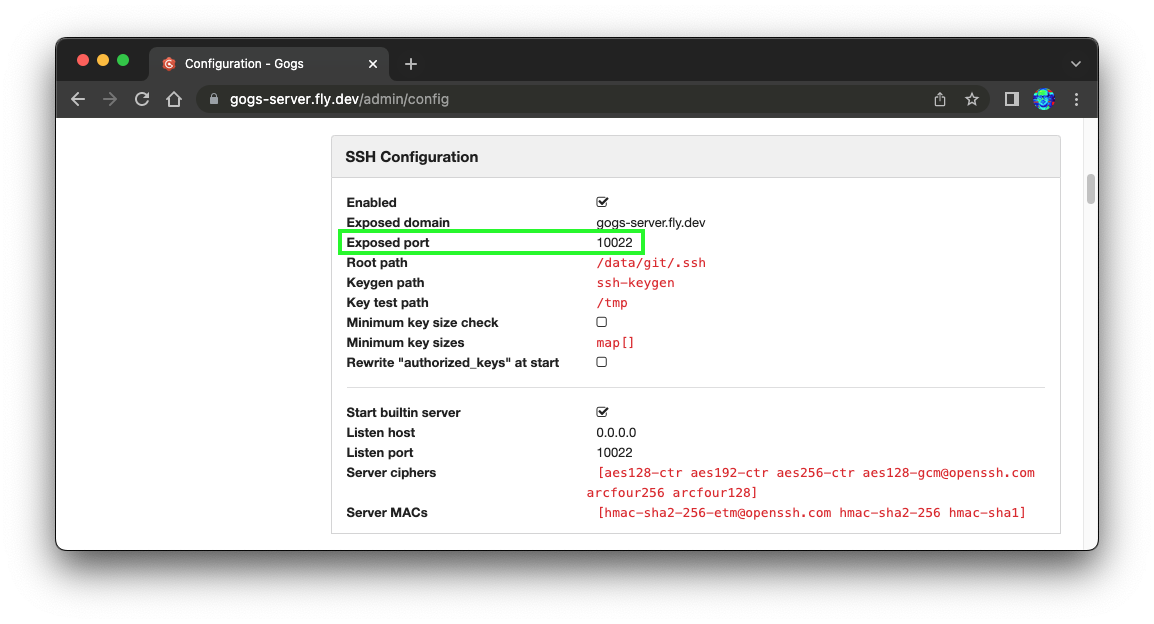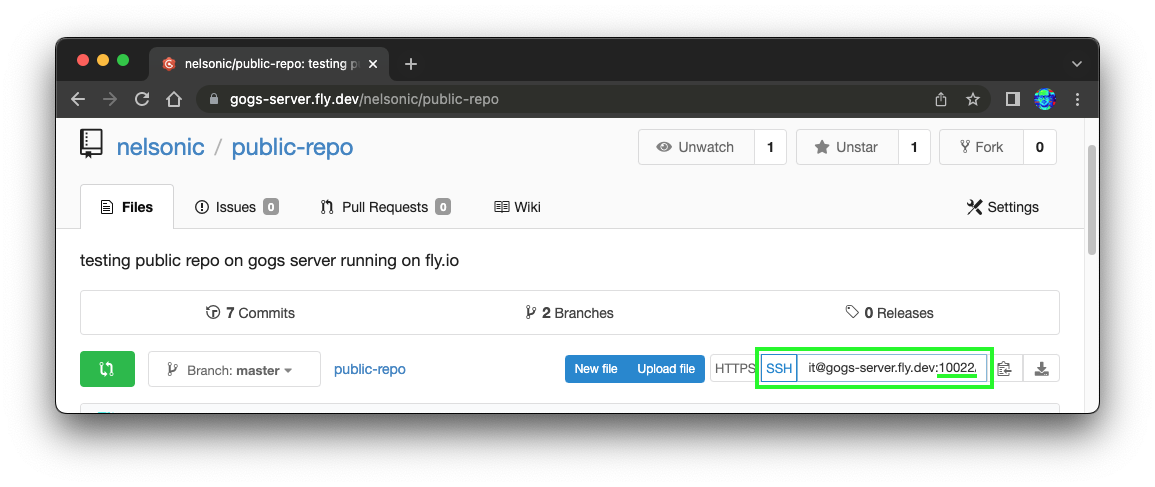We needed an easy way to interact
with our Gogs (GitHub Backup) Server
from our Elixir/Phoenix App.
This package is that interface.
Note: We were briefly tempted to write this code inside the Phoenix App that uses it, however we quickly realized that having it separate was better for testability/maintainability. Having a separate module enforces a separation of concerns with a strong "API contract". This way we know this package is well-tested, documented and maintained. And can be used and extended independently of any
Elixir/Phoenixapp. TheElixir/Phoenixapp can treatgogsas a logically separate/independent entity with a clear interface.
A library for interacting with gogs (git)
from Elixir apps.
Hopefully this diagram explains how we use the package:
For the complete list of functions, please see the docs: https://hexdocs.pm/gogs 📚
This library is used by our (Phoenix) GitHub Backup App.
If you find it helpful for your project,
please ⭐ on GitHub:
github.com/dwyl/gogs
There are a couple of steps to get this working in your project.
It should only take 2 mins if you already have your
Gogs Server deployed (or access to an existing instance).
If you want to read a step-by-step complete beginner's guide to getting
gogsworking in aPhoenixApp, please see: github.com/dwyl/gogs-demo
Install the package from hex.pm,
by adding gogs to the list of dependencies in your mix.exs file:
def deps do
[
{:gogs, "~> 1.0.2"}
]
endOnce you've saved the mix.exs file,
run:
mix deps.getIf you are writing tests for a function that relies on gogs (and you should!)
then you can add the following line to your config/test.exs file:
config :gogs, mock: trueFor gogs to work
in your Elixir/Phoenix App,
you will need to have
a few environment variables defined.
There are 3 required and 2 optional variables. Make sure you read through the next section to determine if you need the optional ones.
See:
.env_sample
There are 3 required environment variables:
-
GOGS_URL- the domain where your Gogs Server is deployed, without the protocol, e.g:gogs-server.fly.dev -
GOGS_ACCESS_TOKEN- the REST API Access Token See: https://github.com/dwyl/gogs-server#connect-via-rest-api-https -
GOGS_SSH_PRIVATE_KEY_PATH- absolute path to theid_rsafile on yourlocalhostorPhoenixserver instance.
@SIMON: this last env var currently not being picked up. So it will just use
~/simon/id_rsaYou will need to add yourpublickey to the Gogs instance for this to work on yourlocalhostsee: https://github.com/dwyl/gogs-server#add-ssh-key
If your Gogs Server is configured
with a non-standard SSH port,
then you need to define it:
GOGS_SSH_PORT
e.g: 10022 for our
Gogs Server deployed to Fly.io
You can easily discover the port by either visiting your
Gogs Server Config page:
https://your-gogs-server.net/admin/config
e.g: https://gogs-server.fly.dev/admin/config
Or if you don't have admin access to the config page,
simply view the ssh clone link on a repo page,
e.g: https://gogs-server.fly.dev/nelsonic/public-repo
In our case the GOGS_SSH_PORT e.g: 10022.
If you don't set it, then gogs will assume TCP port 22.
If you want to specify a directory where
you want to clone git repos to,
create a GIT_TEMP_DIR_PATH environment variable.
e.g:
export GIT_TEMP_DIR_PATH=tmpNote: the directory must already exist. (it won't be created if it's not there ...)
If you just want to read
the contents of a file hosted on
a Gogs Server,
write code similar to this:
org_name = "myorg"
repo_name = "public-repo"
file_name = "README.md"
{:ok, %HTTPoison.Response{ body: response_body}} =
Gogs.remote_read_raw(org_name, repo_name,file_name)
# use the response_body (plaintext data)This is exactly the use-case presented in our demo app: dwyl/gogs-demo#4-create-function
Here's a more real-world scenario in 7 easy steps:
# Define the params for the remote repository:
org_name = "myorg"
repo_name = "repo-name"
private = false # boolean
# Create the repo!
Gogs.remote_repo_create(org_name, repo_name, private)
⚠️ WARNING: there is currently no way to create an Organisation on theGogsServer viaREST APIso theorg_namemust already exists. e.g: https://gogs-server.fly.dev/myorg We will be figuring out a workaround shortly ... #17
git_repo_url = Gogs.Helpers.remote_url_ssh(org_name, repo_name)
Gogs.clone(git_repo_url)Provided you have setup the environment variables, and your
Elixir/PhoenixApp has write access to the filesystem, this should work without any issues. We haven't seen any in practice. But if you get stuck at this step, open an issue
Once you've cloned the Git Repo from the Gogs Server
to the local filesystem of the Elixir/Phoenix App,
you can read any file inside it.
org_name = "myorg"
repo_name = "public-repo"
file_name = "README.md"
{:ok, text} == Gogs.local_file_read(org_name, repo_name, file_name)file_name = "README.md"
text = "Your README.md text"
Gogs.local_file_write_text(org_name, repo_name, file_name, text)This will create a new file if it doesn't already exist.
{:ok, msg} = Gogs.commit(org_name, repo_name,
%{message: "your commit message", full_name: "Al Ex", email: "alex@dwyl.co"})# Push to Gogs Server this one is easy.
Gogs.push(org_name, repo_name)# Confirm the README.md was updated on the remote repo:
{:ok, %HTTPoison.Response{ body: response_body}} =
Gogs.remote_read_raw(org_name, repo_name, file_name)
"Your README.md text"Rather than duplicate all the docs here, please read the complete function reference, on hexdocs: https://hexdocs.pm/gogs/Gogs.html
By default, the tests run with "mocks",
this means that:
- Functional tests run faster (0.2 seconds)
- Tests that require filesystem access will run on GitHub CI.
- We know that functions are appropriately
["Test Doubled"]
so that a downstream
Elixir/Phoenixapp can run inmock: trueand tests will be mocked (and thus fast!)
To alter this setting to run the tests without mocks, simply change the boolean from:
config :gogs, mock: trueTo:
config :gogs, mock: falseYou should still see the same output as all the functions should be tested.
When you run the command:
mix c(an alias for mix coveralls.html)
You will see output similar to the following:
Finished in 0.1 seconds (0.1s async, 0.00s sync)
3 doctests, 27 tests, 0 failures
Randomized with seed 715101
----------------
COV FILE LINES RELEVANT MISSED
100.0% lib/git_mock.ex 55 7 0
100.0% lib/gogs.ex 212 41 0
100.0% lib/helpers.ex 131 17 0
100.0% lib/http.ex 119 18 0
100.0% lib/httpoison_mock.ex 124 20 0
[TOTAL] 100.0%
----------------If you want to run the tests without mocks (i.e. "end-to-end"),
update the line in config/test.exs:
config :gogs, mock: falseWhen you run end-to-end tests with coverage tracking:
mix cYou should see the same output:
Finished in 5.5 seconds (5.5s async, 0.00s sync)
3 doctests, 27 tests, 0 failures
Randomized with seed 388372
----------------
COV FILE LINES RELEVANT MISSED
100.0% lib/git_mock.ex 55 7 0
100.0% lib/gogs.ex 212 41 0
100.0% lib/helpers.ex 131 17 0
100.0% lib/http.ex 119 18 0
100.0% lib/httpoison_mock.ex 124 20 0
[TOTAL] 100.0%
----------------The only difference is the time it takes to run the test suite.
The outcome (all tests passing and 100% coverage) should be identical.
If you add a feature to the package,
please ensure that the tests pass
in both mock: true and mock: false
so that we know it works in the real world
as well as in the simulated one.
We are aiming to do a 1:1 feature map between GitHub and Gogs
so that we can backup our entire organisation, all repos, issues, labels & PRs.
We aren't there yet and we might not be for some time. The order in which we will be working on fleshing out the features is:
- Git Diff - using the
Gitmodule to determine the changes made to a specific file between two Git commits/hashes. This will allow us to visualize the changes made and can therefore derive the contents of a Pull Request without having the PR feature exposed via the Gogs API. See: #27 - Issues: https://github.com/gogs/docs-api/tree/master/Issues
- Comments - this is the core content of issues.
We need to parse all the data and map it to the fields in
Gogs. - Labels - the primary metadata we use to categorize our issues, see: https://github.com/dwyl/labels
- Milestones - used to group issues into batches, e.g. a "sprint" or "feature".
- Repo Stats: Stars, watchers, forks etc.
- Your Feature Request Here!
Seriously, if you spot a gap in the list of available functions,
something you want/need to use
Gogsin any a more advanced/custom way, please open an issue so we can discuss!
As always, if anything is unclear or you are stuck getting this working, please open an issue! github.com/dwyl/gogs/issues we're here to help!
This package is provided "as is".
We make no guarantee/warranty that it works.
We cannot be held responsible
for any undesirable effects of it's usage.
e.g: if you use the Gogs.delete/1
it will permanently/irrecoverably delete the repo.
Use it with caution!
With the disclaimer out of the way, and your expectations clearly set, here are the facts: We are using this package in "production". We rely on it daily and consider it "mission critical". It works for us an and we have made every effort to document, test & maintain it. If you want to use it, go for it! But please note that we cannot "support" your usage beyond answering questions on GitHub. And unless you have a commercial agreement with [dwyl Ltd.]
If you spot anything that can be improved, please open an issue, we're very happy to discuss!










